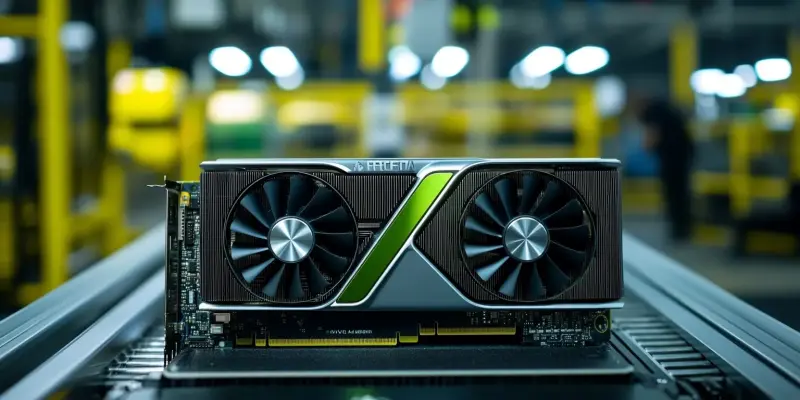Amidst an evolving landscape influenced by shifting economic policies and tariffs, Nvidia strategically navigates these challenges by leveraging Mexico-based production. The Trump administration’s tariff policies posed significant hurdles for tech companies like Nvidia, particularly in managing costs of AI data center servers. Nvidia, heavily dependent on the Taiwan Semiconductor Manufacturing Company (TSMC) for GPU products, faced substantial potential price hikes. However, manufacturing these servers in Mexico provides a viable route to circumvent these tariffs, courtesy of the United States-Mexico-Canada Agreement (USMCA).
The Impact of USMCA on Nvidia’s Production Strategy
The USMCA plays a pivotal role in Nvidia’s approach to sidestepping tariffs, offering opportunities for tariff exemptions on products manufactured in Mexico. By exploiting these exemptions, Nvidia maintains competitive pricing for its AI data center servers. Stacy Rasgon, a senior analyst at Bernstein Research, emphasized that Nvidia’s AI server hardware, comprising a significant portion of the company’s sales, is largely unaffected by the new tariffs. Research indicated that roughly 60 percent of Nvidia’s server shipments, including DGX and HGX systems, are produced in Mexico, while around 30 percent comes from Taiwan. This strategic distribution ensures that a substantial majority of Nvidia’s AI servers remain free from the impact of tariffs.
Jensen Huang, Nvidia’s CEO, has confidently stated that tariffs will not significantly affect the company in the foreseeable future, attributing this to the increased production capabilities in Mexico. Partnering with Foxconn, Nvidia expanded its manufacturing operations in Mexico to further mitigate potential tariff impacts. This partnership and geographic diversification underscores Nvidia’s adeptness in navigating complex economic landscapes, ensuring resilience amidst restrictive trade policies and maintaining market stability.
Broader Implications and Economic Resilience
Nvidia’s production and strategic positioning in Mexico not only shields the company from immediate tariff impacts but also highlights broader implications for the tech industry. The adaptability demonstrated by Nvidia mirrors a growing trend among tech companies, emphasizing the importance of diversified manufacturing locations to manage economic uncertainties. Analysts and Nvidia’s internal evaluations underscore a consensus that the AI data center products stand resilient against political and economic shifts, courtesy of these mitigation strategies.
The strategic move also signals a shift in manufacturing paradigms within the tech industry, where reliance on single-source production in regions susceptible to tariffs is increasingly seen as vulnerable. !=Nvidia’s response serves as an example of proactive adaptation, encouraging other tech enterprises to implement geographically diversified production strategies. == This adaptation not only mitigates risks associated with tariffs but also prepares companies to handle future economic policies with greater flexibility and robustness.
Conclusion: Moving Forward with Strategic Adaptation
Amid an ever-changing landscape shaped by evolving economic policies and tariffs,==Nvidia adeptly meets these challenges by utilizing production facilities in Mexico. == The tariff policies enacted during the Trump administration created significant obstacles for tech giants like Nvidia, particularly in the cost management of AI data center servers. Nvidia, which heavily relies on the Taiwan Semiconductor Manufacturing Company (TSMC) for its GPU products, faced considerable potential price increases.==However, producing these servers in Mexico offers an effective solution to bypass these tariffs, thanks to the United States-Mexico-Canada Agreement (USMCA). == This trade agreement facilitates smoother and more cost-effective operations, enabling Nvidia to mitigate the financial impact of restrictive tariff policies.==Therefore, Mexico-based production serves as a strategic move for Nvidia, allowing the tech leader to navigate through economic uncertainties and maintain its competitive edge in the AI and data center markets. ==

